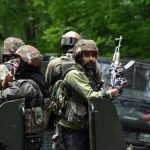JAMMU, JULY 23: Finance Minister NirmalaSitharaman presented the Union Budget 2024 in Parliament today, marking her seventh consecutive budget presentation. The budget emphasises support for the poor, women, youth, and farmers, with a focus on increased spending, job creation, and tax relief for the middle class.
Key changes in taxation include an increase in the Securities Transaction Tax (STT), a revision in short-term and long-term capital gains taxes, and the abolition of the angel tax. Additionally, the budget introduces modifications to the personal income tax slabs under the new tax regime. The standard deduction has been raised from ₹50,000 to ₹75,000. Income tax rates under the new regime are now set at 0% for income up to ₹3 lakh, 5% for income between ₹3 lakh and ₹7 lakh, 10% for income between ₹7 lakh and ₹10 lakh, 15% for income between ₹10 lakh and ₹12 lakh, 20% for income between ₹12 lakh and ₹15 lakh, and 30% for income exceeding ₹15 lakh. These changes will allow salaried employees to save up to ₹17,500.
In a notable announcement, the Centre will provide one month’s salary as a Provident Fund contribution to those entering their first job, benefitting 21 million youngsters. This contribution, up to ₹15,000, will be deposited in three instalments through Direct Benefit Transfer. Additionally, employers will be reimbursed up to ₹3,000 per month for two years for each additional employee’s EPFO contribution.
The budget also proposes raising the limit of exemption for capital gains on certain financial assets to ₹1.25 lakh per year and abolishing the angel tax for all investor classes.
Significant infrastructure projects were earmarked for Bihar and Andhra Pradesh. Bihar will see the development of expressways connecting Patna to Purnea, Buxar to Bhagalpur, and another linking Bodhgaya, Rajgir, Vaishali, and Darbanga. A two-lane bridge over the Ganga in Buxar and a 2,400 MW power plant at Pirpainti in Bhagalpur are also planned. The state is included in the Purvodaya initiative to enhance development in Eastern India.
In Andhra Pradesh, where the NDA recently won the Assembly polls, the focus will be on infrastructure improvements in railways and roadways.
Union Budget 2024-25 Highlights:
Economic Overview:
Inflation:Stable near 4%; Core inflation at 3.1%.
Growth:India remains a growth beacon amid global uncertainties.
Key Budget Provisions:
Fiscal Deficit:Estimated at 4.9% of GDP.
Total Receipts:₹32.07 lakh crore.
Total Expenditure:₹48.21 lakh crore.
Net Tax Receipts: ₹25.83 lakh crore
Market Borrowings:Lower than previous year, with ₹14.01 lakh crore gross and ₹11.63 lakh crore net borrowings.
Key Focus Areas:
Poor, Women, Youth, and Farmers:Higher MSPs, extended food schemes, and administrative action on implementation.
Employment and Skilling:₹2 lakh crore for 4.1 crore youth; new incentives and schemes for job creation and skilling.
Agriculture:
High-Yielding Crops:Release of 109 varieties.
Natural Farming:Support for 1 crore farmers.
Pulses and Oilseeds:Strengthening self-sufficiency.
Employment and Skilling :
Incentives:Wage support for new entrants, job creation in manufacturing, and EPFO reimbursement for employers.
Skilling Schemes:New centrally sponsored scheme and revised Model Skill Loan Scheme.
Social Security & Personal Income Tax :
Increased Deductions: Raise standard deduction and family pension deductions.
New Tax Regime Rates:
– 0-3 lakh rupees: Nil
– 3-7 lakh rupees: 5%
– 7-10 lakh rupees: 10%
– 10-12 lakh rupees: 15%
– 12-15 lakh rupees: 20%
– Above 15 lakh rupees: 30%
– Savings: A salaried individual can save up to ₹17,500 in income tax.
New pension scheme ‘Vatsalya’ announced for minors; parents, guardians to contribute
Deduction on family pension increased from ₹ 15,000 to ₹ 25,000
Infrastructure:
Capital Expenditure: ₹11,11,111crore allocated.
PM Gram SadakYojana: Connectivity to 25,000 rural habitations.
Manufacturing &Services :
MSMEs:Credit Guarantee Scheme with ₹100 crore covers, enhanced credit assessment, and Mudra loan limits doubled.
Urban Development :
Housing:₹10 lakh crore for urban housing under PM AwasYojana Urban 2.0.
Water Supply & Sanitation:Projects in 100 cities.
Stamp Duty:Encouraging states to reduce rates.
Energy Transition:
PM Surya GharMuftBijliYojana:Free electricity for 1 crore households.
Pumped Storage Policy:Promoting energy storage projects.
Tourism:
Nalanda and Odisha:Development and revival projects for tourism.
Innovation & R&D :
Anusandhan National Research Fund:₹1 lakh crore for research.
Space Economy:₹1,000 crore venture capital fund.
Reforms:
Land Reforms:ULPIN for land identification, digitization, and improved property record administration.
Labor Reforms:Integration of e-shram portal, revamped compliance portals.
Customs Duty Changes:
Medicines & Medical Equipment:Exemptions for cancer medicines.
Mobile Phones:BCD reduced to 15%.
Critical Minerals:Exemptions for 25 minerals.
Solar Energy:Expanded exemptions for solar cell manufacturing.
Additional Measures:
E-Commerce Export Hubs:Establishment to aid MSMEs.
Industrial Parks:”Plug and play” parks in 100 cities.
Rental Housing:Development of dormitory-type housing for industrial workers.
Key Highlights of the Budget Proposals:
Capital and Entrepreneurship Reforms:
Financial Sector Vision: Develop a strategy for the next five years to enhance the financial sector’s size, capacity, and skills.
Climate Finance Taxonomy: Create a framework to boost climate finance for adaptation and mitigation.
Variable Capital Company Structure: Seek legislative approval for a flexible financing model for leasing aircraft, ships, and private equity funds.
Simplified Investment Rules: Streamline Foreign Direct Investment (FDI) and Overseas Investments rules, and promote the Indian Rupee for international transactions.
NPS-Vatsalya Plan: Introduce a scheme for minor’s contributions to seamlessly transition into a regular NPS account.
Indirect Taxes:
GST and Customs Duties: Further simplification and expansion of GST; custom duty proposals to support domestic manufacturing and export competitiveness.
Sector-Specific Changes:
Medicines: Full exemption for three cancer drugs.
Mobile Phones: Reduction in duties on mobile parts.
Critical Minerals: Exemptions to support strategic sectors.
Solar Energy: Expanded exemptions for solar manufacturing.
Leather/Textiles: Duty reductions to enhance export competitiveness.
Chemicals/Petroleum: Increased duties on specific items.
Telecommunications: Increased duties on telecom equipment parts.
Direct Taxes
Income-Tax Act Review: Comprehensive review for clarity and reduced disputes.
Charity and TDS Simplification: Merge exemption regimes, simplify TDS rates, and decriminalize minor TDS delays.
Reassessment and Capital Gains: Simplify reassessment rules and capital gains taxation.
Taxpayer Services: Digitalize major services and introduce new resolution schemes for tax disputes.
Investment and Employment: Abolish angel tax, simplify tax for foreign shipping and mining, and reduce corporate tax rates for foreign companies.
Tax Base Expansion: Increase Security Transactions Tax, tax share buybacks, and adjust STT rates.








